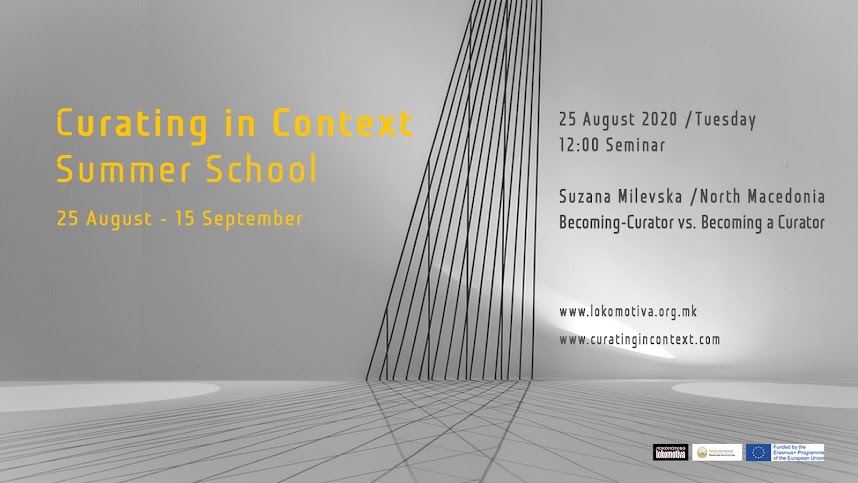SEMINAR – Suzana Milevska: Becoming-Curator vs. Becoming a Curator
Abstract:
Topic Tags: Curating curatorial curator offspring curatorial agency
In recent times, curating has provided a
point of cross-disciplinary interchange between several distinguished
disciplines and professions that deal with art. The courses and university
departments that initially taught curating as a subject mainly focused on its
practice, but such a dichotomy no longer exists now that curating is taught as
a subject or course in many different departments and universities, and the
term itself is used in a much broader terms. This presentation will therefore
address the question how the concept of curatorial relates to both the theory
and practice of curating.
I want to argue that “curatorial” and
“curatorial knowledge” have advanced into terms that encompass the condition in
which philosophy, theory and epistemology are intertwined and produced a new
discourse and culture that are not limited to understanding of curating as
merely theory or practice. I will focus on the Deleuzian concept of “becoming”
in the context of the self-differentiation and self-actualisation of an art
curator. I particularly intend to discuss the conundrums that stem from the
event(s) of “becoming-curator”. The main challenge is to unravel how a person
knows what he or she knows as a curator, and how one reconciles the differences
and contradictions between “being-curator,” “becoming a curator” and
“becoming-curator.” I will also address some related empirical issues such are
the problem of historicising curating while attempting to understand curatorial
and the differences between the role of the independent curatorial practice and
the institutional(ised) one.
- The self as an offspring event,
instead of an essence
- Teaching, production,
epistemology as events from which you become the offspring
- Becoming curator as feminist
becoming
- Curating as practice and the
curatorial as disturbance
- Becoming subject/curator is not
about creating new identities, more about expressing differences without
overwriting them
- Becoming curator as a way to
destabilize, deconstruct and decolonize knowledge
- Curatorial agency: embed in your
practice and produce (art is agency)
- Discussion terms related to:
space, conflict, institutions, trauma, violence.
- How does art history relate to
theory and practice of curating?
- How did the pandemic affect my
curating?
- What do space and institutions
mean when we can’t be in them?
- How do you access locality when
it’s not there?
Document with Excerpts, references and quotations:
1. Introduction: Philosophical, epistemological and institutional definition:
Jean Paul Martinon, The Curatorial: A Philosophy of Curating, London:
Bloomsbury Academic, 2013.
2. Philosophical ignition: Deleuze, Gilles/Guattari, Félix 1987, A Thousand
Plateaus: Capitalism and Schizophrenia. Trans. Brian Massumi. London: The
Athlone Press, p. 291.
3. Feminist commentary on Deleuze based on: Colebrook, Claire (1999): “A
Grammar of Becoming: Strategy, Subjectivism, and Style.” In Elizabeth Grosz
(ed.): Becomings – Explorations in Time, Memory, and Futures. Ithaca: Cornell
University Press
4. Personal becoming: Suzana Milevska, “With Special Thanks To: A Balkan
Curator in First Person Feminine,“ Open Space Journal, 2013.
http://www.openspace-zkp.org/2013/en/journal.php?j=3&t=9
Suzana Milevska_abstract_becoming_readings.pdf
PRESENTATION from the Seminar by Suzana Milevska
Suzana Milevska Becoming-Curator Vs. Becoming A Curator last
with images.pdf
Suzana Milevska
is a theorist and
curator of visual art and
culture. From 2016 to 2019 Milevska was Principal Investigator
of the Horizon 2020 project TRACES, Polytechnic University Milan, and she curated its final exhibition Contentious
Objects/Ashamed Subjects.
She was Endowed
Professor for Central and South Eastern European
Art Histories at the Academy of Fine Art Vienna (2013 - 2015). She curated numerous international exhibitions such are The Renaming Machine (2008-2011), Roma Protocol, Austrian
Parliament, Vienna, and Call the Witness, BAK Utrecht (2011). She initiated the project Call the Witness–Roma Pavilion, Venice Biennale
(2010-2011). In 2015 she curated the exhibition Inside Out: Not So White Cube, City Art Gallery, Ljubljana (with
Alenka Gregorič). She holds a PhD in visual cultures from
Goldsmiths College London and she was Fulbright Senior Research Scholar. In 2012 she won Igor Zabel Award for Culture and Theory. She
published the
books Gender Difference in the Balkans, 2010,
The Renaming Machine: The Book, 2010, and
On Productive Shame, Reconciliation, and Agency, SternbergPress, 2016.






Comments
Post a Comment